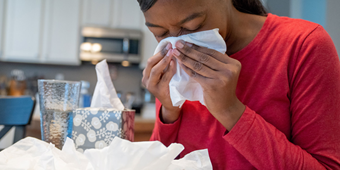When You’re Itching for Relief: Coping with Hives

Find Your Perfect Match
Answer a few questions and we'll provide you with a list of primary care providers that best fit your needs.
If you have allergies, you may be all too familiar with hives — the red, itchy bumps that can show up on your skin and make you miserable! How can you find relief?
Also known as urticaria, hives are usually caused by an allergic reaction to certain foods or medicines. Not everyone with allergies gets hives, but at some point in their lives, about 20 percent of people will be affected by hives. Most cases are short-lived, lasting anywhere from a few minutes to a few days. Chronic hives last longer, appearing daily for more than six weeks, and should be treated by an allergist.
Some people with hives can have a more severe allergic reaction, called anaphylaxis, a potentially life-threatening condition that, among other things, causes the airways to narrow, making breathing difficult. Anaphylaxis is a medical emergency and requires immediate medical care. If you’re having an anaphylactic reaction, take epinephrine medicine if you have it, and call 911 or get to an emergency room.
What Causes Hives?
Hives can be caused by any number of substances, but they most often show up in people who are allergic to particular foods or medicines. Some foods that can cause hives include:
- Peanuts and other nuts
- Eggs
- Shellfish
- Wheat
- Milk
Medicines that can trigger allergic reactions in some people include:
- Antibiotics, especially penicillin and medicines that contain sulfa
- Nonsteroidal anti-inflammatory drugs (NSAIDs), such as ibuprofen and naproxen
- Anticonvulsant or antiseizure medicines
- Chemotherapy medicines
- ACE inhibitors for high blood pressure, such as lisinopril or enalapril
Hives can also result from, or be made worse by, environmental factors or other causes, such as:
- Infection or virus
- Stress
- Heat
- Cold air or cold water
- Exercise
- Scratching or rubbing your skin
- Pet dander
- Pollen
- Insect bites or stings
Sometimes hives can come and go with no specific cause at all!
Hives can be caused by any number of substances, but they most often show up in people who are allergic to particular foods or medicines.
How are Hives Diagnosed?

To diagnose hives, your doctor will look at your skin and ask about your recent medical history. Because there are so many potential causes, tracking down the precise trigger for a case of hives can be difficult, if not impossible. If you have a stubborn case, your doctor may recommend that you be treated by an allergist, who may perform skin, blood and urine tests to help identify the cause.
Finding Relief from Hives
If you know the foods or medicines or other factors that sometimes make you break out in hives, be sure to avoid those triggers. To help you find relief during an active case of hives, your doctor might recommend taking antihistamines. To calm the skin directly, your doctor may also suggest cold compresses and an anti-itch salve.
If you’ve never experienced hives before, and if they are making you uncomfortable, it’s a good idea to call your health care provider. If your hives seem particularly severe and are covering a large part of your body, or if you’re having other troubling symptoms, such as difficulty breathing, go to the emergency room or call 911.
Find Your Perfect Match
Answer a few questions and we'll provide you with a list of primary care providers that best fit your needs.
Source: Asthma and Allergy Foundation of America; American College of Allergy, Asthma & Immunology; MedlinePlus




